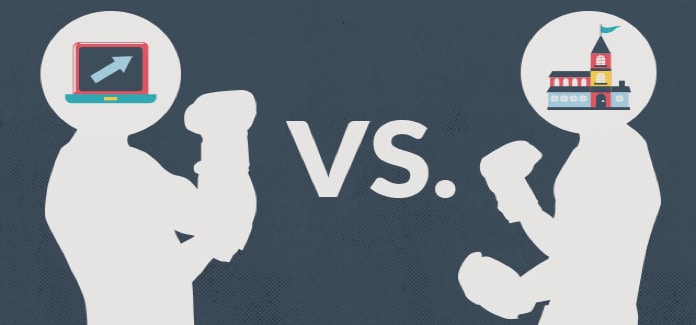The decision between an online MBA or a full contact, in-class MBA is one of the biggest decisions for prospective students.
If you are planning on getting your MBA and deciding whether to enrol in a traditional, campus-based or online MBA, it is important to know the differences and more importantly the disadvantages and advantages of both.
Online and traditional MBAs both share the same goal of preparing students for working in the field of business management. They also share similar curriculums and coursework, and are designed to have the same level of difficultly. Most of the top business schools around the world now offer their own online MBAs, with the online stigma slowly disappearing. Now, the most important thing you must work out is which delivery method suits you, your requirements and your preferences.
Here we look at some of the biggest differences between online and traditional MBAs.
Flexibility
One of the main benefits of an online MBA over a traditional one is flexibility. Online coursework allows you to complete your degree from wherever you are, whenever you choose. Remote learning allows you to schedule your study time around work and family commitments. It’s an option for people who want to accommodate education into their existing work and personal lives, not reorganise their entire life around the MBA.
Gabriel O’Sullivan, Southern Cross University Online’s Operations Manager believes the traditional bricks and mortar universities are starting to view online learning as not just inevitable but a response to what the market is demanding.
“Most of our students already have demanding full time jobs and family commitments meaning they just wouldn’t have the time to complete an on-campus MBA course.
“Our students tell us they love the flexibility of online learning; they can log on and study at times that suit their schedule and learning style.”
Reputation
A major benefit of attending a traditional program is reputation. MBA graduates from renowned business school programs are still viewed with higher regard from many employers and those in the business world. But online MBAs are slowly losing this stigma, with more students completing their education online and more prestigious business schools beginning to offer distance learning.
Cost
MBA programs are becoming increasingly expensive and time consuming. While some traditional MBA programs at top schools can cost upwards of $80,000, students in many of these programs sacrifice salaries and build up debt. Completing your MBA online can sometimes lessen these constraints, with some online courses often being less expensive and the flexibility allowing you to continue to work while studying.
Interaction
While many schools that offer MBAs online and in-class offer the same content, the difference lies in how that content is distributed. On campus you’ll be taught face-to-face through lectures, tutorials and assignments, with the majority of coursework handed directly to teachers. With online learning, you’ll receive your coursework through video lectures, downloadable assignments, text and audio files. Instead of seeing your fellow students and teachers in-class, you’ll rely on video, email and phone chat.
Discipline
While some flourish in a flexible online learning environment, others require the more structured approach of a classroom. Studying online will require you to be more focussed and disciplined, setting your own deadlines and completing tasks without reminders from classmates and teachers. In a traditional environment you’ll be required to attend classes and have the daily in-person support from peers.
Experience
Online MBAs can teach discipline, help build online technical skills and allow you to work on your own terms. You learn to work in an independent environment and develop your personal and professional skills at your own pace.
Leanne Done, After Hours Hospital Manager and current online MBA student at Southern Cross University attributes her ability to make better decisions at work to her MBA studies and believes that it opened her eyes to other opportunities.
“With online learning, you are able to study at your own pace, in your own time and that is the best and most convenient thing about the online version of an MBA,” Ms Done said.
Traditional settings can be just as rewarding for students – having the opportunity to meet new people, experience new places and feel a part of a community.
Career Services
Attending on-campus course work will give you greater access to university staff with any career-related concerns. Students have greater flexibility when it comes to speaking with on-campus recruiters or having their resumes reviewed by the business school’s career services centre. On campus allows for a more hands-on approach, with help usually just around the corner. Many reputable schools offering online education will also provide career services however there will be the obvious time, distance and communication barriers.
Technology
With online MBAs being delivered electronically, technology is an important factor to consider. While a good grasp on technology will undoubtedly be necessary through a traditional MBA, online MBAs will require a stronger knowledge of computers and technology. All lectures, assignments, exams and coursework will be accessed through computers.
Ms O’Sullivan believes that an online MBA can unlock doors that people felt were previously out of reach and with online learning, access to MBA courses is more attainable and convenient than ever.
“In today’s globally connected and constantly switched on marketplace, more and more business is conducted online so it makes sense that education is following suit and tailoring learning to the needs of the modern student.”










